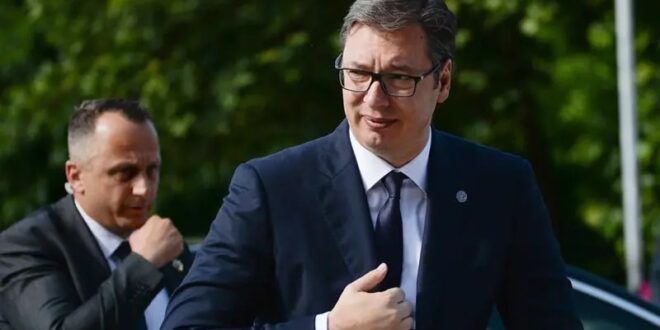Three months after it was announced, Serbia has made little progress in implementing President Aleksandar Vucic’s five-point plan to “safeguard the future” of Serbs in Kosovo.
On September 13, Serbian President Aleksandar Vucic announced a five-point plan to safeguard the future of Serbs who live in a northern pocket of Kosovo, responding to a crackdown by Kosovo authorities on Serb-run, Belgrade-backed ‘parallel institutions’.
He announced the plan in a typically meandering address to the nation, hotly anticipated by government-friendly media.
“From the documents you received,” Vucic told the gathered reporters, “you will see how serious and responsible the Serbian state is.”
Three months on, however, BIRN’s analysis of the plan’s progress shows that none of the five points Vucic outlined has been fulfilled in full.
Some are in progress, but it is unclear when they will be finished or what their real impact might be.
Serb return to institutions
Vucic defined the first step as a “return to status quo ante”.
“We want to return to everything that was achieved in the process and procedure of the dialogue,” he said, in reference to European Union-mediated talks between Belgrade and Pristina, which began in 2011.
The talks were aimed at ‘normalising’ relations between the two following Kosovo’s 2008 declaration of independence, which Serbia does not recognise. Over 13 years on, negotiations are still ongoing.
In his address, Vucic set a raft of conditions for “any serious progress” in the dialogue: local elections in the four Serb-majority municipalities in the north of Kosovo, “with the participation of the OSCE mission and EU control”, and the return to work of Kosovo Serb police officers, judges and prosecutors who resigned en masse in November 2022 in coordinated protest against alleged breaches of agreements made between Serbia and Kosovo in Brussels.
Vucic also demanded the withdrawal of Kosovo special police checkpoints in the northern municipalities; the “urgent, immediate and final” formation of an association of Serb-majority municipalities as agreed in the Brussels negotiations but still being resisted by the Kosovo government.
He further called for the “immediate implementation” of security guarantees given in December 2022 by the EU and the NATO-led peacekeeping force, KFOR and the release of Serbs arrested for erecting barricades or taking part in protests.
On top of that, he said he wanted the “immediate enabling of smooth payment transactions and postal services”, in reference to Kosovo’s crackdown on the use of the Serbian dinar and postal service in the northern municipalities. Kosovo’s official currency is the euro but Serbian money was widely used in the north.
Dragisa Mijacic, director of the Belgrade-based Institute for Territorial Economic Development, InTER, says Step 1 amounted to an admission “that a mistake was made when the Serbs withdrew from the institutions”.
“By this, they are asking for the unconditional return of the Serbs to the institutions they left without fulfilling the conditions that caused the Serbs to leave the institutions,” he said. Those conditions included the creation of the association of Serb-majority municipalities.
Vucic, he said, had put the ball in Pristina’s court, “knowing both then and now that it would be impossible to implement [Vucic’s conditions] on the eve of the election campaign in Kosovo”.
Kosovo is due to hold a parliamentary election on February 9, 2025.
Laws pending
Vucic said parliament would adopt to laws, one declaring Kosovo an “area of special social protection” and the other asserting Serbian jurisdiction over crimes committed in Kosovo since the day it declared independence in February 2008.
The first effectively provides financial aid for unemployed and elderly Serbs in Kosovo who do not have an income. A list of those eligible for the support should be drawn up by end-January 2025.
The second calls for the creation of a special department within the Higher Prosecution in Belgrade for tackling crimes committed in Kosovo, which would then be tried before the Higher Court and the Court of Appeal in the Serbian capital. Experts told BIRN Serbia has no means to carry out criminal investigations on the territory of Kosovo and that the law is little more than a publicity stunt.
The laws have yet to be adopted in parliament.
‘Remote’ public services
Another step called for the opening of government offices in Rudnica and Ribarici, just inside Serbia’s border with Kosovo, where Vucic said Kosovo Serbs would be able to access Serbian public services.
Local media reported that one such office was set up in Rudnica on October 8.
Tatjana Lazarevic, editor-in-chief of Mitrovica-based news outlet KosSev, said that certain Serbian state institutions had begun working “remotely”, but questioned the impact.
“The most vulnerable segments of society are additionally burdened by travelling to ‘border’ towns, by the additional costs, by the further exhaustion and weakening of this part of the population,” she said.
The additional effort and complication required “makes a nonsense of their remaining in their place of residence”.
Rejection of Kosovo laws
As the fifth step, Vucic announced that parliament would adopt a decision “on the illegality of all bodies and institutions established on the territory of Kosovo and Metohija after the illegal unilateral declaration of independence, as well as the non-existence of all their acts that have been passed or will be passed”.
“Everything they [the Kosovo government] make as decisions and are contrary to the Brussels Agreement, such as the establishment of their police bases, their police authorities in the north… are non-existent, invalid for us,” Vucic said.
The Brussels Agreement of 2013 called for the creation of association of Serb-majority municipalities as well as the integration of Serbs into the police, judiciary and security structures of Kosovo.
This parliamentary decision was supposed to happen within 45 days of Vucic’s address. It did not happen.
 Eurasia Press & News
Eurasia Press & News



